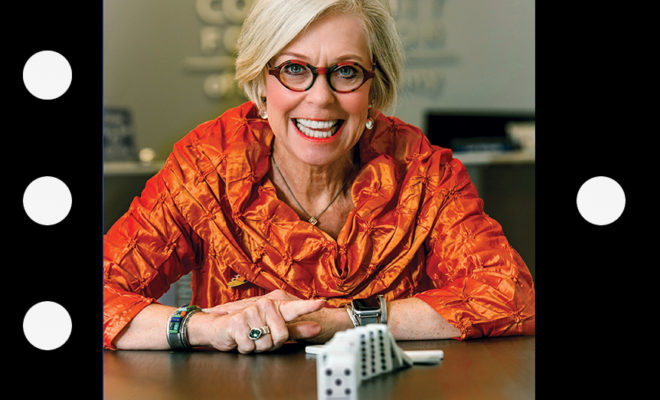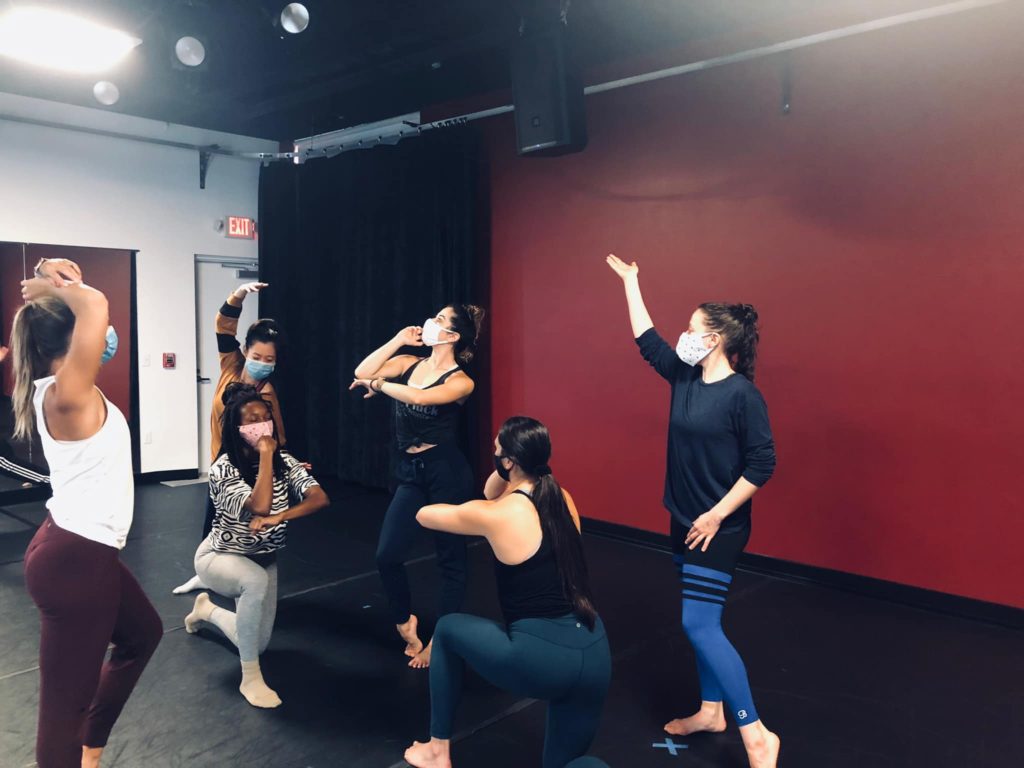
Feature
One Good Thing Leads to Another
How a Legacy Founded on Sisterly Love Helped Inspire an Artful “Digital Neighborhood”
By Sylvia Whitman | Header photo of Roxie Jerde by Nancy Guth
This story of the domino effect of philanthropy begins with a tale of two sisters, Muriel and Gertrude. As Roxie Jerde, President and CEO of the Community Foundation of Sarasota County, tells it, their lives were always entwined. Born in Chicago, they both started out as writers in New York. Muriel went on to a distinguished career in publishing, working at American Heritage, The New York Times, and various magazines. Gertrude returned to school in her 50s and became a psychiatrist. Neither had children, so when they retired, Muriel O’Neil and Dr. Gertrude Hight bought separate condos on the same floor of a downtown Sarasota high-rise overlooking the bay. As donors, volunteers, and audience members, they enjoyed and supported WEDU and performing arts around town.
Muriel died first, in 2013, leaving her estate to Gertrude. Talking to Muriel’s lawyer at Williams Parker, Gertrude confessed that she didn’t need the money. Maybe she could honor her sister with a gift to the nonprofits she loved? Referred to the Community Foundation, Gertrude set up The Muriel O’Neil Fund for the Performing Arts.
The sisters’ generosity has rippled throughout the arts community. Administered by the Community Foundation, this $3.1 million legacy fund has underwritten a costume studio and a sound system, new rehearsal spaces and ongoing programming. It has kick-started capital campaigns. There are student scholarships and at least one new staff position in Muriel’s name. At Gertrude’s direction, the Community Foundation structured the fund to spend out over a decade or so, but Jerde says administrators have reserved some money for unexpected needs and opportunities. So, when Muriel’s beloved WEDU began seeking support for a pioneering digital “docuseries,” the Muriel O’Neil Fund gave a $50,000 grant toward the launch.
Creating a Neighborhood Online
When Paul Grove became president and CEO of WEDU in 2019, he made expanding hyperlocal storytelling a strategic priority. For more than 60 years, this public television station has served west central Florida with traditional broadcasts: What if it developed a multiplatform series of short documentaries on local subjects that would premiere online first? Conceived before the pandemic, Greater Sarasota (to be followed by Greater other locales within WEDU’s 16-county viewership area) aims to create a sort of “digital neighborhood,” explains executive producer and WEDU director of content Kristine Kelly. Each artfully produced mini-story will be “easy to share, easy to trade on social media, and easy to forward to friends, to get the content circulating on a grass-roots level. And the beauty of a digital series is that it lives on in digital space, so we can keep it available.”
As support from the Muriel O’Neil Fund came aboard, Greater Sarasota inevitably focused on the city’s performing arts. The Community Foundation hosted a lunch in early 2020 to brainstorm with leaders of local arts organizations to talk up the advantages of collaborating with WEDU, Jerde says. For the chosen few, the concise and highly visual digital documentaries could go up on a website and circulate among supporters and potential donors. Win-win all around.
Then the coronavirus struck, sending everyone scrambling, says Kelly. All involved agreed that the Greater series could be “a window into our community, but what does that even mean right now?”
The Community Foundation had given WEDU a long list of arts organizations of different sizes and visions. The Greater team researched “who we thought had the most interesting take on pivoting during the pandemic. We tried to look at ones that had a topical story for this time, digging deep into how they evolved their art.” WEDU also had to puzzle through the logistics of production in a time of social distancing. Producer, cinematographer, and editor Laura Landry developed workarounds, shooting outside when possible, for instance, and wearing face masks and using longer lenses indoors.
The first digital documentary, Music in Transition, debuted online and on air in October. It profiles ensembleNEWSRQ, a chamber music group that had to reimagine its concert series as it entered a fifth season amidst COVID-19. Warm and intimate, the 7-minute video spotlights percussionist George Nickson and violinist Samantha Bennett, romantic partners as well as co-artistic directors.
Next up and in production for December is a digital documentary on Sarasota Contemporary Dance (SCD). Co-founder Leymis Bolaños Wilmott describes SCD as another “small but mighty organization,” a rare contemporary dance company that has survived into its 15th season. According to WEDU’s Kelly, the production team plans to interview not only Bolaños Wilmott but also founding board member Muriel Meyers, 91, and dancer Rachel Lambright, 25, who graduated from Booker High’s Visual and Performing Arts program before studying dance at USF. It’s all part of Greater Sarasota’s vision to examine the arts “from every perspective.”
A Sense of Hope
The coronavirus dealt a body blow to dance companies, but many have found innovative ways to persevere. Bolaños Wilmott has resisted a total move online, however.
“I don’t like seeing dance on video, unless the dance was created for the camera,” she says. “Hearing the dancers’ feet on the floor, seeing them sweat—it’s all about having that visceral human experience in the moment.” She says she’s also thinking of her dancers. “We are entertainers. We want to be able to share what’s stirring in us.” How then to balance performers’ and viewers’ physical and mental health?
“My community holds me accountable to show up.I hope people see that and show up for us.”
— Bolaños Wilmott
As an artist, mom, and New College instructor, Bolaños Wilmott says she’s used to improvising. While many organizations canceled shows, SCD moved into the Historic Asolo Theater at The Ringling. SCD has followed public health protocols to create a bubble for the company, limiting the audience to 50 people—socially distanced, temperature checked, and masked. Deeply faithful, Bolaños Wilmott has also prayed over the studio and the stage, “anointing the space.”
“My community holds me accountable to show up,” she says. “I hope people see that and show up for us.”
At the same time, SCD is accommodating a remote audience through livestreaming. With funding from the Community Foundation, the organization has hired professional videographer Brett Hoehne, of Integrated Media Productions—and charged him to film from unusual angles, such as overhead, to create an immersive experience as unique as the live performance, with “dance almost coming out of the screen.”
Finding ways to navigate these times has fueled her sense of hope, Bolaños Wilmott says. The child of immigrants, she has always assumed that hard work will prevail. “Resilience is in my DNA.” She has no doubt SCD will emerge from the pandemic even stronger than before.
Along with livestreaming, the Greater Sarasota series promises to introduce SCD to people who don’t know the company’s story. Bolaños Wilmott and FSU classmate Rachel Inman founded the group to share “the gift that is dance” with the community through classes as well as performances. “We embrace diverse bodies,” says Bolaños Wilmott. After people see WEDU’s digital documentary, she hopes that they “start to consider us part of the contemporary arts landscape. I just want them to be proud of Sarasota Contemporary Dance. It has their name in it.”

Jerde of the Community Foundation has high hopes for Greater Sarasota as well. The digital docuseries serves WEDU and the individual organizations, which can use the professionally produced segments on their websites and social media. “In this world, it’s so important to have original content and short bites,” she says, “and we’re seeing this as a really novel way for each organization to use their own network and supporters to push this out to the community as a whole.”
WEDU and the Community Foundation will be counting clicks and crossing fingers for awards, but Jerde anticipates that the Muriel O’Neil Fund will continue underwriting the Greater series for several years. A legacy created out of a sister’s love inspired gifts that have triggered a domino cascade of change, connecting several nonprofits through meaningful, community-based storytelling. And although Muriel and Gertrude never anticipated the hardships arts organizations face today, Jerde says, they would be proud to be part of the outpouring of philanthropy seen during the pandemic. “I know we have a long way to go,” she adds, “but we are going to get to the other side of this.”



You must be logged in to post a comment Login